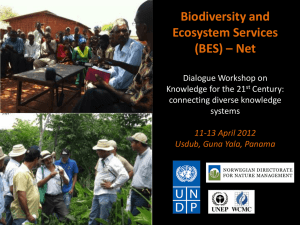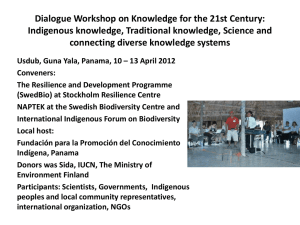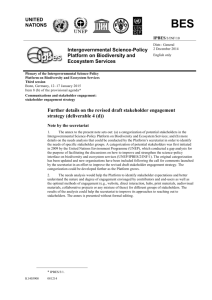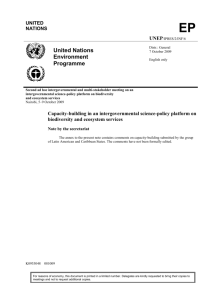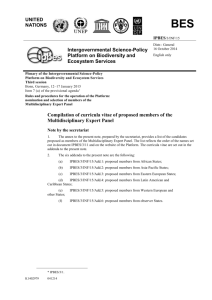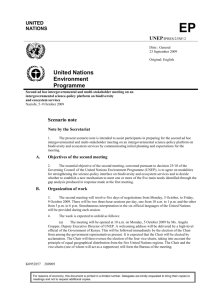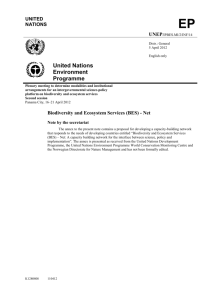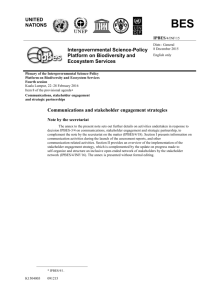Kuala Lumpur, 22–28 February 2016
advertisement
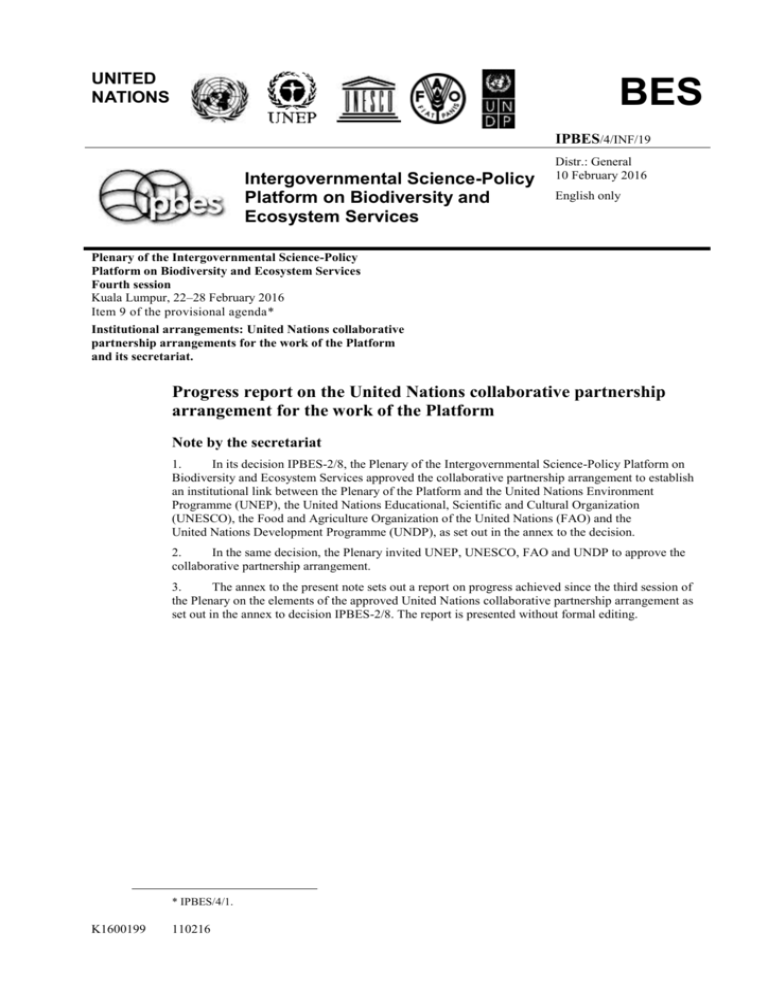
UNITED NATIONS BES IPBES/4/INF/19 Intergovernmental Science-Policy Platform on Biodiversity and Ecosystem Services Distr.: General 10 February 2016 English only Plenary of the Intergovernmental Science-Policy Platform on Biodiversity and Ecosystem Services Fourth session Kuala Lumpur, 22–28 February 2016 Item 9 of the provisional agenda* Institutional arrangements: United Nations collaborative partnership arrangements for the work of the Platform and its secretariat. Progress report on the United Nations collaborative partnership arrangement for the work of the Platform Note by the secretariat 1. In its decision IPBES-2/8, the Plenary of the Intergovernmental Science-Policy Platform on Biodiversity and Ecosystem Services approved the collaborative partnership arrangement to establish an institutional link between the Plenary of the Platform and the United Nations Environment Programme (UNEP), the United Nations Educational, Scientific and Cultural Organization (UNESCO), the Food and Agriculture Organization of the United Nations (FAO) and the United Nations Development Programme (UNDP), as set out in the annex to the decision. 2. In the same decision, the Plenary invited UNEP, UNESCO, FAO and UNDP to approve the collaborative partnership arrangement. 3. The annex to the present note sets out a report on progress achieved since the third session of the Plenary on the elements of the approved United Nations collaborative partnership arrangement as set out in the annex to decision IPBES-2/8. The report is presented without formal editing. * IPBES/4/1. K1600199 110216 IPBES/4/INF/19 Annex Progress report on the elements of the adopted United Nations Collaborative Partnership Arrangement (decision IPBES-2/8) I. Dedicated capacity and secondments or otherwise assigned staff are made available by the Organizations to support the secretariat of the Platform 1. UNEP is providing the Platform’s secretariat, which is solely accountable to the IPBES Plenary on policy and programmatic matters. The recruitment of a number of vacant posts is on-going (see IPBES/4/2 for further details). In addition, UNEP-WCMC has continued to support the IPBES Secretariat in 2015 with additional capacity dedicated to the work of the Secretariat, thanks to funding from the IPBES trust fund. UNEP continues to provide a dedicated professional Programme Officer (P4) as an in-kind contribution to the IPBES Secretariat. UNEP has also continued with provision of financial support from China to provide a dedicated consultant seconded to the IPBES Secretariat in Bonn in support of the work programme. 2. UNESCO continues in its role as the Technical Support Unit (TSU) for the IPBES task force on indigenous and local knowledge systems (ILK). 3. UNESCO and its Intergovernmental Oceanographic Commission (IOC) have made expertise available to the IPBES task force on knowledge and data. 4. The UNDP BES-Net team is currently composed of: a Capacity Network Coordinator, since September 2014; the Director of the Nairobi-based Global Policy Centre on Resilient Ecosystems and Desertification (GPC–Nairobi), through which BES-Net links to UNDP’s support to countries on sustainable management of renewable natural capital for livelihoods and jobs and social and ecological resilience in drylands and other fragile ecosystems; the Manager of the Biodiversity Global Programme, through which BES-Net links to UNDP’s support to local communities, including the Equator Initiative partnership and the UNDP-managed GEF Small Grants Programme; the Senior Technical Adviser and a Results and Knowledge Specialist of the UNDP Global Environment Fund (UNDP-GEF) ensuring linkages with the UNDP-GEF Portfolio and BES-Net; a Policy Specialist on Resilience based in the GPC–Nairobi; a Senior Policy Adviser to UNDP ensuring links with the UNDP work on the BIOFIN initiative and the NBSAP Forum; a BES-Net web-portal Support Officer; and two interns based in UNDP Regional Offices. II. Technical and programmatic supports are provided by the Organizations for the work programme of the Platform at the global and regional levels on issues related to the mandates and programmes of work of the Organizations The four United Nations bodies have continued to support the implementation of the IPBES work programme as follows: For UNEP: 5. UNEP has continued to support the implementation of the IPBES work programme as follows: (a) Continuing to provide programmatic and administrative staff to support the work of the Secretariat, including through the provision of legal advisory services to the Plenary; (b) Providing staff as experts in support of specific deliverables, such as a review editor on the assessment of scenario analysis and modelling, and a member of the working group on methodological assessment of diverse conceptualization of multiple values of nature and its benefits to people; 6. The 5th meeting of MEP and Bureau accepted the offer from UNEP’s Ecosystem Services Unit to provide technical support to the IPBES Deliverable 3(d) on diverse conceptualization of multiple values of nature and its benefits, including biodiversity and ecosystem functions and services, for one year. This support has been in place since April 2015, during which time both the preliminary guide on “diverse conceptualization of multiple values…” and the Scoping document for the full Assessment on “diverse conceptualization of multiple values…” were revised and further developed by the 3(d) 2 IPBES/4/INF/19 Expert Group and submitted to the IPBES-4. The Preliminary guide provides a tool consistent with the IPBES framework to incorporate diverse values and valuation in different assessments. 7. UNEP-WCMC is continuing to provide technical and logistical support to the Secretariat, including supporting the delivery of 2(a) guide on production and integration of assessments from and across all scales, and supporting preparation for publication of the two assessments submitted to the fourth session of the IPBES Plenary (deliverables 3(a) and 3(c)). The continued support for the preparation of the guide for assessments is supported financially by the Government of Norway, while the support to publications is funded by the IPBES trust fund. In addition, UNEP-WCMC has worked with key stakeholders to prepare an e-learning module on the IPBES Conceptual Framework. 8. UNEP-WCMC is continuing to provide support to the technical support unit for the task force on capacity-building (deliverable 1(a) and 1(b)) established by the Government of Norway at the Norwegian Environment Agency. During 2015 this included supporting training/orientation sessions at the five first author meetings held during the year, and also planning and facilitating a training session for the IPBES fellows. Also, at the invitation of the task force chairs, UNEP-WCMC is providing resource persons to support the task force on capacity-building (relating to the work of the SGA Network) and the task force on knowledge and data (relating to the work of the Biodiversity Indicators Partnership). 9. UNEP, through UNEP-WCMC, provides support to the Sub-Global Assessment Network, which is a community of practice amongst assessment practitioners. During 2015 this has included convening an Africa workshop in Ethiopia and an Asia-Pacific workshop in Viet Nam, as well as sharing experience through a range of other mechanisms including six webinars. In addition, regional hubs have been established in Colombia (for Latin America and the Caribbean) and South Africa (for the Southern Africa Development Community). Financial support is provided by the European Union and the Governments of Norway and Sweden. 10. During 2015 UNEP-WCMC and UNDP also collaborated on a successful proposal to the Government of Germany “Supporting developing country capacity to address science-policy questions through IPBES via the UNDP managed Biodiversity and Ecosystem Services Network (BES-Net) and the UNEP-WCMC hosted Sub-Global Assessment Network (SGA Network).” 11. Decision IPBES-2/7 requested UNEP to establish a trust fund for the Platform. The Trust fund has been operational since 2014, and an update on the financial status of the trust fund is provided in document IPBES/4/13. For UNESCO: 12. UNESCO has taken a special interest in assisting with specific deliverables of the IPBES Work Programme 2014–2018. In relation to Deliverable 3(c): Policy support tools and methodologies for scenario analysis and modelling of biodiversity and ecosystem services based on a fast track assessment and a guide, UNESCO organized an expert workshop on Participatory Scenarios, which was kindly hosted by the United nations University in Tokyo, Japan in June 2014 and funded by the Japan Ministry of the Environment. The expert meeting (of which the outcome is reported in document IPBES/4/INF/22) assisted in elucidating aspects related to the applicability of participatory approaches to scenario building at, and across, multiple scales, in support of further implementation of IPBES scenarios. 13. An ancillary expert workshop on reconciling scenarios of biodiversity and ecosystem services with climate change scenarios is being co-organized by UNESCO, the Secretariat of the Convention on Biological Diversity and France. The workshop will take place at UNESCO Headquarters in Paris, France in spring 2016 and will contribute lessons and recommendations on reconciling the above-mentioned scenarios, also in support of Deliverable 3(c). 14. Deliverable 3(d) on diverse conceptualization of multiple values of nature and its benefits, including biodiversity and ecosystem functions and services will benefit from the organization of an ancillary expert workshop specifically devoted to the notion of ‘relation values’, which will bridge conventional approaches valuation of biodiversity and ecosystem services. The expert workshop, expected to take place in Bilbao, Spain, in June 2016 and to be hosted by the Basque Centre for Climate Change (which also provides expertise to the IPBES Expert Group on Values and Valuation), will be financed by UNESCO and the Japan Ministry of the Environment. 15. In relation to the Deliverable 1(c) on indigenous and local knowledge systems (ILK), UNESCO in its capacity as the TSU for the task force on ILK organized task force meetings in Bonn in April 2015 and in Paris in September 2015, as well as ILK dialogue workshops in the framework of the regional assessments for Africa (Paris, September 2015) and for Europe and Central Asia (Paris, 3 IPBES/4/INF/19 January 2016). It also supported numerous contributions of the task force on ILK to other ongoing IPBES assessments and events. UNESCO published a report on “ILK about pollination and pollinators associated with food production” as a contribution to the assessment on that theme. As the TSU, UNESCO prepared documents IPBES/4/7 and IPBES/4/INF/6 on the work of the task force on ILK towards fulfilling deliverable 1(c) of the work programme. 16. UNESCO has mobilized the contribution of the Ocean Biogeographic Information System (OBIS), a free and open-access data holding and sharing facility, hosted by the Intergovernmental Oceanographic Commission of UNESCO in view of its contribution to relevant IPBES assessments. UNESCO-IOC’s contribution of relevant data and information under OBIS, as well as of relevant expertise in marine biodiversity and ecosystem service data management, will be instrumental in involving the ocean biodiversity community in IPBES. 17. Through its active participation in the World Database of Protected Areas and the Sub-Global Assessment Network, UNESCO’s Man and the Biosphere Programme continues contributing to site-level assessments of biodiversity and ecosystem services in its World Network of Biosphere Reserves (651 sites in 120 countries). The MAB strategy (2015–2025) adopted last May 2015 by the MAB Council and endorsed in November 2015 by the 38 th General Conference will be implemented through an Action plan, to be adopted at the forthcoming 4th World Congress of Biosphere Reserves in Lima, Peru (March 2016) which makes substantive provision for research and co-production of knowledge on biodiversity and ecosystem services and stakeholders engagement. 18. The total UNESCO contribution to the IPBES Work Programme in 2014–2015 was approximately US$ 400,000, covering UNESCO and its IOC staff time, consultants’ fees, and organization of expert workshops, as well as communication activities, of which approximately 120,000 were provided by the Japan Ministry of the Environment. For FAO: 19. Based on requests and resources available, FAO and its decentralized offices could consider providing technical and programmatic support to regional structures that may be established by IPBES to facilitate the implementation of the work programme of IPBES. 20. FAO has made an overall contribution of USD 90,373 in 2015, including in-kind contributions, and a significant in-kind contribution will continue to be provided to the Platform through contribution of FAO technical staff– including through travel and participation at technical meetings - in the areas of biodiversity and ecosystem management, assessment, analysis of policy and legislative environments to support ecosystems service provision, monitoring and public awareness. Two FAO staff members provided support as Resource Persons to the fast-track assessment on pollination. They attended relevant meetings of the authors in this role and provided guidance throughout the process. In addition, one FAO Resource Person attended the 2nd Authors meeting held in Brazil, in March 2015. 21. FAO was pleased to host the 3rd Authors meeting of the pollination assessment at FAO Headquarters, in Rome. The meeting was held from 27-31 July, 2015 and attended by approximately 80 participants. 22. In addition, building on its technical activities and networks established under its Global Action on Pollination Services for Sustainable Agriculture, and through funding provided by the Government of Norway, FAO has been working to contribute knowledge to the assessment on pollinators and pollination. The work contributed to enhancing the science-knowledge-policy interface in pollination services by assisting countries to apply the pollination deficit protocol, inviting the contribution of indigenous people and local communities to assessing pollination deficits, building the capacity in participating countries to detect trends and indications from pollination deficits, and facilitating the identification, mapping, modelling and analysis of options for action in areas experiencing such deficits. The major outcomes of this project were direct contributions to the IPBES pollination thematic assessment, and included: (i) applying the pollination deficit protocol to selected countries and undertaking a meta-analysis (together with the GEF/UNEP/FAO Global Pollination Project partner countries). The results are being published in Science, in January 2015; (ii) Building capacity to analyze trends in pollination deficits with local communities, through the Indigenous Partnership for Agrobiodiversity and Food Sovereignty. and finally (iii) Expanding capacity to design policy analyses and identify policy venues and communication strategies, resulting in the publication “Policy Analysis Paper: Mainstreaming of Biodiversity and Ecosystem Services With A Focus On Pollination”. 4 IPBES/4/INF/19 23. In December 2014, FAO brought representatives of the indigenous communities from Nicaragua and Peru to participate in the IPBES Global Dialogue Workshop on Indigenous Knowledge about Pollination and Pollinators associated with Food Production, a workshop supported by USDA, Smithsonian Tropical Research Institute, UNESCO and FAO. 24. FAO hosts the secretariat of the Global Soil Partnership (GSP) and facilitates the implementation of the GSP actions through its regional partnerships and networks. The Intergovernmental Technical Panel on Soils (ITPS) provides scientific and technical advice on global soil issues. FAO facilitated interactions with IPBES in order to forge mutually fruitful cooperative links between ITPS and IPBES on the thematic assessment of land degradation and restoration. FAO supported participation of the Chairperson of the Inter-Governmental Technical Panel on Soils (ITPS) of the GSP to the first author meeting of the Land Degradation and Restoration assessment (LDRA), in his capacity as co-chair of that assessment. For UNDP: 25. In line with decisions taken at the third session of the IPBES Plenary and in support of decision IPBES/2/5, UNDP has continued to support the needs of IPBES in terms of capacity building (deliverable 1(b)), policy support, as well as stakeholder engagement and communications (deliverable 4(d)), through its Biodiversity and Ecosystem Services Network (BES-Net). 26. So far, BES-Net has been implemented through partnerships with the Norwegian Environment Agency and SwedBio at the Stockholm Resilience Centre, to help countries tackle science-policy questions critical to effective management of biodiversity and ecosystems worldwide, thereby contributing to long-term human well-being and sustainable development. 27. The Network is supported by face-to-face capacity building activities (the BES-Net Trialogues), a matchmaking facility, and a cutting-edge web portal – with all components mutually reinforcing. 28. UNDP and IPBES are currently working to establish an agreement defining the scope, roles and responsibilities, issues related to branding and intellectual property and other legal requirements regarding the collaboration between BES-Net (UNDP) and IPBES. 29. In the meantime, until such agreement has been established, BES-Net and IPBES have already engaged in preliminary work at the technical level, in coordination with the IPBES secretariat, the IPBES Task Force on Capacity Building and its Technical Support Unit and the Expert Group on Policy Support Tools and Methodologies on: ˗ the prototype IPBES capacity building matchmaking facility (deliverable 1(a)); and ˗ the prototype IPBES catalogue of policy support tools and methodologies (deliverable 4(c)). ˗ Place holders for those IPBES products, are available on the BES-Net web portal and will be further developed and made live as per the IPBES guidance 30. BES-Net has also developed specific webpages and online collaboration tools to support the coordination work of the IPBES Stakeholder Network. 31. UNDP is developing the BES-Net web-portal as complementary to the IPBES website, supporting capacity building in IPBES through online learning, networking and collaboration, and allowing for support in terms of communication and stakeholder engagement. 32. In addition, UNDP has mobilized its network in support of BES-Net, including global teams, global policy centers as well as its regional and national offices. They will be involved in the development of the content of the BES-Net web portal and in the organization of face-to-face capacity building activities. Their capacity building expertise, knowledge of best practices in the field and of challenges in the science-policy-practice arena will therefore be capitalized upon. 33. BES-Net now counts more than 60 international organizations, working on diverse aspects of the biodiversity and ecosystem services, and representing the three communities of policymaking, practice and science/knowledge, as well as 70 international experts, who agreed to respond to BES-Net web portal users’ questions. 5 IPBES/4/INF/19 34. Over the period 2016-2020, the German BMUB will support a project for “Supporting developing country capacity to address science-policy questions through IPBES via the UNDP managed Biodiversity and Ecosystem Services Network (BES-Net) and the UNEP-WCMC hosted Sub-Global Assessment Network (SGA Network)”. The project aims at supporting developing countries to address science-policy questions highlighted through IPBES, through: ˗ Enhancing capacity at the national and regional levels to apply the findings of IPBES assessments. This is achieved through the UNDP-managed BES-Net capacity network hosting “Trialogue” events bringing together scientists, policy-makers and practitioners to address pressing development questions. ˗ Providing technical and capacity building support to specific countries to conduct national assessments of scientific evidence on policy issues, complementing IPBES regional and thematic assessments – achieved through customized support to countries via centres of excellence and the SGA Network. 35. The total BES-Net budget for 2015 was US$ 516,000, covering UNDP staff time, consultants’ fees, travel and contractors, including the web design company, which developed the BES-Net web-portal. 36. All the BES-Net activities are guided by the BES-Net Advisory Committee, composed of the BES-Net donors, the IPBES Secretariat, various IPBES groups and bodies (TSU for the CB TF), and other resource organizations to the CB TF, such as the Secretariats of the CBD, and SGA Network. The co-chairs of the Capacity Building Task Force are kept informed of the Committee’s process and the other UN Agencies supporting the IPBES process have been invited as observers. 37. Please see document IPBES/3/INF/19 for the initial BES-Net strategy and document IPBES/4/INF/21 for further information on its implementation status. III. Exchange of information 38. Regular consultation and exchange of information have taken place among the four UN organizations, with a focus on joint work in relation to some of the specific deliverables as described in section II above. 39. Joint outreach efforts have also been undertaken such as: (a) A side event on BES-Net, organized during the UNCCD COP 12, held in Ankara, Turkey, on 12 October 2015, with participation from the UNCCD Secretariat and an IPBES expert involved in the IPBES thematic assessment on land degradation and restoration, and UNDP participation to a UNCCD side event on the UNCCD Knowledge Products; (b) A side event organized during the CBD SBSTTA 19, in coordination with the CBD Secretariat team working on the Bio-Bridge Initiative on 2 November 2015, in Montreal, Canada and participation in an International Expert Workshop on Bio-Bridge, held in Seoul, Republic of Korea, on 17 and 18 December, 2015; (c) A contribution to the SGA Network capacity building workshop held from 24 to 28th August 2015 in Addis Ababa, Ethiopia; (d) Participation to the First IPBES Capacity Building Forum, held in Dehradun, India, from 19-22 October 2015; (e) Participation to the Africa Rising Conference, hosted by SANBI, GBIF, UNEP-WCMC, USAID, the European Commission, and JRS Biodiversity Foundation, held in Cape Town, South Africa from 19-22 May 2015. IV. Attendance at meetings of the platform 40. Representatives of and designated experts proposed by the four UN organizations have attended and supported meetings of the various IPBES Task Forces, expert groups, and respective TSUs in line with the programmatic and technical support being provided by the four UN organizations and outlined in section II above. 41. Representatives of the four UN organizations have participated in meeting of the IPBES MEP in an observer capacity. 42. The IPBES Secretariat has informed the four UN organizations of upcoming meetings of IPBES in a timely manner. 6 IPBES/4/INF/19 V. Staff 43. In addition to the staff of the Secretariat funded from the IPBES Trust Fund, UNEP continues to provide a dedicated professional Programme Officer (P4) as an in-kind contribution to the IPBES Secretariat1. 44. UNESCO continues to provide staff time (P5, P4 and G staff) as its agreed contribution (50%) towards the staffing of the TSU for the task force on ILK. This in-kind contribution was considerably increased in the 2015–2016 intersessional period to compensate for the very late receipt of IPBES funds for the work of the task force on ILK. 45. VI. Further information on staffing is provided in IPBES/4/13 Visibility 46. The four UN organizations promote actively the work of IPBES through their various communication channels. 1 To be reflected in IPBES/4/13 7
